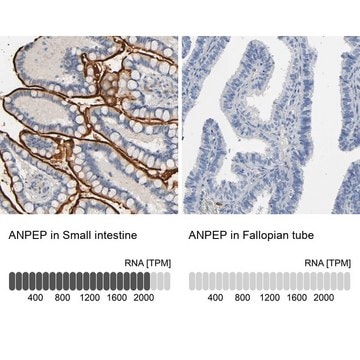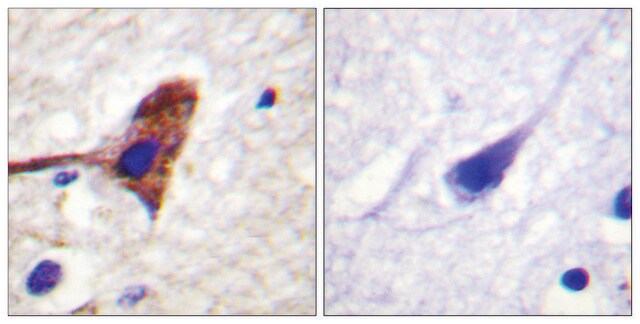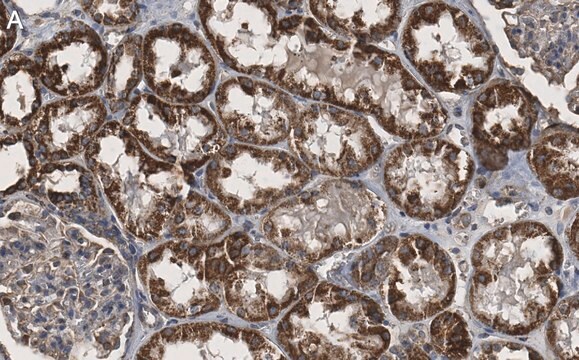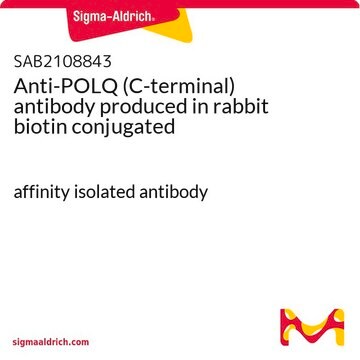General description
We are committed to bringing you greener alternative products, which adhere to one or more of the 12 Principles of Green Chemistry. This antibody is preservative-free, produced without the harm or sacrifice of animals and exceptionally stable to allow for ambient shipping and storage if needed, and thus aligns with "Waste Prevention", "Designing Safer Chemicals" and "Design for Energy Efficiency".
Click here for more information.
ZooMAb® antibodies represent an entirely new generation of recombinant monoclonal antibodies. Each ZooMAb® antibody is manufactured using our proprietary recombinant expression system, purified to homogeneity, and precisely dispensed to produce robust and highly reproducible lot-to-lot consistency. Only top-performing clones are released for use by researchers. Each antibody is validated for high specificity and affinity across multiple applications, including its most commonly used application. ZooMAb® antibodies are reliably available and ready to ship when you need them.
Specificity
Clone 1H11 is a ZooMAb® rabbit recombinant monoclonal antibody that specifically detects Perforin-1. It targets an epitope within 19 amino acids from the internal region.
Immunogen
KLH-conjugated linear peptide corresponding to 19 amino acids from the internal region of human Perforin-1.
Application
Quality Control Testing
Evaluated by Western Blotting in NK-92 cell lysate.
Western Blotting Analysis: A 1:1,000 dilution of this antibody detected Perforin-1 in NK-92 cell lysate.
Tested Applications
Flow Cytometry Analysis: 1 µg from a representative lot detected Perforin-1 in one million Human peripheral blood mononuclear cells (PBMC)..
Immunohistochemistry (Paraffin) Analysis: A 1:1,000 dilution from a representative lot detected Perforin-1 in Human spleen tissue sections.
Affinity Binding Assay: A representative lot of this antibody bound Perforin-1 peptide with a KD of 5.8 x 10-8 in an affinity binding assay.
Note: Actual optimal working dilutions must be determined by end user as specimens, and experimental conditions may vary with the end user.
Target description
Perforin-1 (UniProt: P14222; also known as P1, Cytolysin, Lymphocyte pore-forming protein, PFP) is encoded by the PRF1 (also known as PFP) gene (Gene ID: 5551) in human. Perforin-1 is a multi-pass membrane glycoprotein that is synthesized with a signal peptide (aa 1-25), which is subsequently cleaved off to produce the mature form that contains two transmembrane domains (aa 129-149 and 257-279). It is stored in cytolytic granules of cytolytic T-lymphocytes and is secreted into the cleft between T-lymphocyte and target cell. Perforin has a thin key-shaped structure consisting of an N-terminal membrane attack complex perforin-like (MACPF)/cholesterol dependent cytolysin (CDC) domain (aa 27-375), which is followed by an EGF domain (aa 376-408) that together with the extreme C-terminal sequence forms a central shelf-like structure. Its C-terminal C2 domain (aa 397-519) mediates initial, Ca2+-dependent membrane binding. Perforin-1 serves as a pore-forming protein that plays a key role in granzyme-mediated programmed cell death, and in defense against virus-infected or neoplastic cells. It also plays an important role in killing other cells that are recognized as non-self by the immune system. It can insert into the membrane of target cells in its calcium-bound form and can oligomerize and form large pores. Its membrane insertion and pore formation require a major conformation change. It promotes cytolysis and apoptosis of target cells by facilitating the uptake of cytotoxic granzymes. Mutations in PRF1 gene have been linked to familial Hemophagocytic lymphohistiocytosis (FHL2), a rare disorder that is characterized by immune dysregulation with hypercytokinemia, defective function of natural killer cell, and massive infiltration of several organs by activated lymphocytes and macrophages. This ZooMAb® recombinant monoclonal antibody, generated by our propriety technology, offers significantly enhanced specificity, affinity, reproducibility, and stability over conventional monoclonals. (Ref.: Praper, T., et al. (2011). J. Biol. Chem. 286(4); 2946-2955; Law, RHP., et al. (2010). Nature. 468(7322). 447-451; Ando, K., et al. (1997). J. Immunol. 158(11); 5283-5291).
Physical form
Purified recombinant rabbit monoclonal antibody IgG, lyophilized in PBS with 5% Trehalose, normal appearance a coarse or translucent resin. The PBS/trehalose components in the ZooMAb formulation can have the appearance of a semi-solid (bead like gel) after lyophilization. This is a normal phenomenon. Please follow the recommended reconstitution procedure in the data sheet to dissolve the semi-solid, bead-like, gel-appearing material. The resulting antibody solution is completely stable and functional as proven by full functional testing. Contains no biocide or preservatives, such as azide, or any animal by-products. Larger pack sizes provided as multiples of 25 µL.
Reconstitution
300 µg/mL after reconstitution at 25 µL per vial. Please refer to guidance on suggested starting dilutions and/or titers per application and sample type.
Storage and Stability
Recommend storage of lyophilized product at 2-8°C; Before reconstitution, micro-centrifuge vials briefly to spin down material to bottom of the vial; Reconstitute each vial by adding 25 µL of filtered lab grade water or PBS; Reconstituted antibodies can be stored at 2-8°C, or -20°C for long term storage. Avoid repeated freeze-thaws.
Legal Information
ZooMAb is a registered trademark of Merck KGaA, Darmstadt, Germany
Disclaimer
Unless otherwise stated in our catalog or other company documentation accompanying the product(s), our products are intended for research use only and are not to be used for any other purpose, which includes but is not limited to, unauthorized commercial uses, in vitro diagnostic uses, ex vivo or in vivo therapeutic uses or any type of consumption or application to humans or animals.










